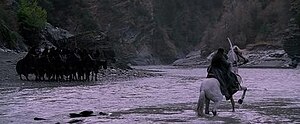I first posted this back in 2015. It seems to be as valid now as then, although I have made significant progress in my recovery from PTSD since then. 9/11, while still powerful, is no longer the single defining tragedy of our time. The COVID-19 pandemic and the criminally negligent US reaction are. My heart goes out to all those who lost loved ones in NYC, and more recently in hospitals, hospices, and alone at home. May these words lighten your grief.
At this time of year, I often feel out of step with the rest of the country. Like just about everyone else I know who's old enough to remember the events of 9/11, I have a vivid memory of how I learned about them. I was driving my younger daughter to high school and we were listening to the news on the car radio. We heard the announcer cry, "The second Tower is down!" and the rest of the story tumbled out. The way the events unfolded reminded me poignantly of John F. Kennedy's assassination. I was in high school in 1963, just about the same age my daughter was on 9/11. Listening to the news broadcast with her, I experienced a parallel of my own youthful experience. Once again, the world became to be a dangerous and unpredictable place, but for me it was not the first time. I too responded with a feeling that the world has changed forever, but I also had the memory of having walked through this before -- and not just the Presidential assassination.
For me, Septembers will never be solely about 9/11. In this month in 1986, my mother was raped and beaten to death by a neighbor kid on drugs. It was a spectacularly brutal, headline-banner crime, but only part of a larger tragedy, for his own family had suffered the murder of his older brother by a serial killer some years before. My body knows when the anniversary is approaching, even when my thoughts are distracted. The shift in the quality of the light at summer's end reaches deep into my nervous system. The scar tissue on my heart aches. The ghosts of things that once held the power to drive me crazy stir in the darkness. My sleep becomes fragile, even though I no longer have nightmares. It's a hard time, an intensely personal time.
One thing I have learned over the years is that grief isn't fungible; you can't compare or exchange one person's experience with another's or say, This one's pain is two-thirds the intensity of that one's. Grief is grief; loss is loss. There's no benefit to anyone in comparisons. And no one else can do the hard emotional work of healing for us.
Around me and in the media, I see public displays of remembrance and more often than not, I feel reluctant to share mine. For one thing, I've lived with my story for over three decades and I've had extensive trauma therapy, but the person I tell it to is hearing it for the first time. "My god," they say, "how did you live through that?" At most times of the year, it's a gift to be able to sit with them, give them time to catch up, and to share a little of what I've learned about healing. But not this season. I need to have a time just for my own grief, a time that is just for my mother.



